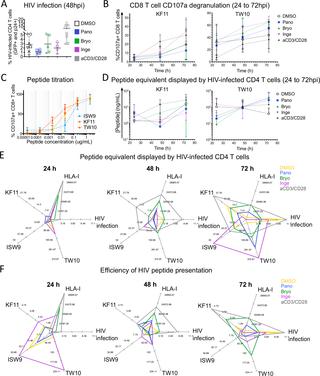PLoS Pathogens ( IF 5.5 ) Pub Date : 2020-03-20 , DOI: 10.1371/journal.ppat.1008442 Julie Boucau 1 , Jishnu Das 2 , Neelambari Joshi 1 , Sylvie Le Gall 1

|
Latency reversal agents (LRA) variably induce HIV re-expression in CD4 T cells but reservoirs are not cleared. Whether HIV epitope presentation is similar between latency reversal and initial infection of CD4 T cells is unknown yet crucial to define immune responses able to detect HIV-infected CD4 T cells after latency reversal. HIV peptides displayed by MHC comes from the intracellular degradation of proteins by proteasomes and post-proteasomal peptidases but the impact of LRAs on antigen processing is not known. Here we show that HDAC inhibitors (HDCAi) reduced cytosolic proteolytic activities while PKC agonists (PKCa) increased them to a lesser extent than that induced by TCR activation. During the cytosolic degradation of long HIV peptides in LRA-treated CD4 T cells extracts, HDACi and PKCa modulated degradation patterns of peptides and altered the production of HIV epitopes in often opposite ways. Beyond known HIV epitopes, HDACi narrowed the coverage of HIV antigenic fragments by 8-11aa degradation peptides while PKCa broadened it. LRAs altered HIV infection kinetics and modulated CD8 T cell activation in an epitope- and time-dependent manner. Interestingly the efficiency of endogenous epitope processing and presentation to CD8 T cells was increased by PKCa Ingenol at early time points despite low levels of antigens. LRA-induced modulations of antigen processing should be considered and exploited to enhance and broaden HIV peptide presentation by CD4 T cells and to improve immune recognition after latency reversal. This property of LRAs, if confirmed with other antigens might be exploited to improve immune detection of diseased cells beyond HIV.
中文翻译:

潜伏期逆转剂调节HIV抗原的加工和呈递给CD8 T细胞。
潜伏逆转剂(LRA)可变地诱导HIV在CD4 T细胞中的重新表达,但未清除储库。潜伏期逆转和CD4 T细胞初始感染之间HIV表位的表达是否相似尚不清楚,但对于定义能够在潜伏期逆转后检测HIV感染的CD4 T细胞的免疫反应至关重要。MHC展示的HIV肽来自蛋白酶体和蛋白酶体后肽酶对蛋白质的细胞内降解,但是LRA对抗原加工的影响尚不清楚。在这里,我们显示HDAC抑制剂(HDCAi)降低了胞浆蛋白水解活性,而PKC激动剂(PKCa)则将其增加的程度小于TCR激活所诱导的程度。在LRA处理的CD4 T细胞提取物中长HIV肽的胞质降解过程中,HDACi和PKCa经常以相反的方式调节肽的降解模式并改变HIV表位的产生。除了已知的HIV表位,HDACi还通过8-11aa降解肽缩小了HIV抗原片段的覆盖范围,而PKCa扩大了它的覆盖范围。LRAs以表位和时间依赖性方式改变HIV感染动力学并调节CD8 T细胞活化。有趣的是,尽管抗原水平低,但PKCa Ingenol在早期时间点提高了内源性表位加工和呈递至CD8 T细胞的效率。应考虑并利用LRA诱导的抗原加工调节来增强和拓宽CD4 T细胞的HIV肽呈递,并改善潜伏期逆转后的免疫识别。LRA的此属性,










































 京公网安备 11010802027423号
京公网安备 11010802027423号